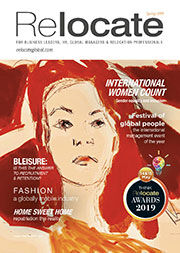Corporate social responsibility: a critical role for global mobility professionals
There is a strong business case argument for engaging in corporate social responsibility (CSR) activities, as well as a moral and social justice case for so doing. Global mobility professionals have a key role to play in helping to support good CSR practices in the deployment of personnel across the globe. Dr Sue Shortland explains.

Corporate social responsibility: a critical role for global mobility
There is much talk in the press about corporate social responsibility and organisations’ reputations in relation to this issue. Big-name firms are known for their contributions to foundations supporting healthcare, education and the environment, for example. This can present a highly positive brand image. On the other hand, examples of less socially responsible business practices (such as efforts taken to reduce tax payments in particular jurisdictions) result in a blaze of negative publicity and customer dissatisfaction, sometimes even loss of sales revenues.CSR is thus a hot topic and one that global mobility professionals need to support in their day-to-day actions. The issue of CSR is widely discussed, but the concept itself is quite broad and requires a degree of ‘unpacking’ to understand its components and benefits. It is also important to appreciate the links between human-resources policies, practices and CSR. In this way, global mobility professionals can ensure that their input into the deployment of individuals and families addresses sustainable CSR principles.What is CSR?
CSR is considered to be a concept through which organisations voluntarily integrate social and environmental concerns within their business operations and interactions with stakeholders. CSR comprises a number of constructs, each of which embraces sets of responsibilities. These constructs refer to economic, legal, ethical and philanthropic responsibilities. Economic responsibility underpins the basis of CSR, as organisations need to be profitable to provide a foundation upon which to offer voluntary social responsibilities. Organisations must enact their legal responsibilities by obeying the laws that reflect how particular societies determine justice based upon right and wrong actions. Ethical responsibilities refer to organisations’ obligations to do what is right, just and fair, avoiding harm. Philanthropic responsibilities refer to good corporate citizenship, through which resources are contributed to the community in order to improve quality of life. These four sets of responsibilities should be fulfilled together in parallel rather than in a sequential manner.Issues covered by CSR are wide-ranging. For example, organisations may engage in actions that demonstrate concern for human rights, such as refusing to trade in certain markets and demonstrating support for social causes. Supporting local education initiatives, community involvement and charitable giving provide further examples. Organisations might also participate in local business initiatives, support national business initiatives and demonstrate a commitment to environmental issues and fair trade. CSR also includes schemes that support employees – both locally recruited personnel and those transferred to work in different countries.The business case
CSR activities are generally considered to provide a wide range of perceived and actual business benefits. As such, a strong business case for CSR is proposed. For example, a good track record in CSR can help to prevent business risks such as corruption or environmental scandals. A good CSR reputation can also help organisations to have greater access to capital, as distinctive ethical values can appeal to particular types of investors. CSR business benefits also include the attraction and retention of customers through enhanced brand image and corporate reputation. CSR can also help to legitimise business and profit levels, avoiding government interventions and public criticism.With respect to human-resource management (HR), CSR also presents significant benefits for talent management and the attraction and retention of high-quality workforces. It is well known that Millennials – who increasingly comprise organisational workforces – are attracted by positive CSR organisational reputations. Working within an organisation with strong CSR principles is reported to enhance employee motivation and commitment. CSR also presents an attractive face of the organisation to local communities, thereby helping to gain acceptance and potential support from host-country governments. This can be particularly beneficial to organisations wishing to enter developing countries where they previously have had little or no presence or experience.Successful integration
CSR and HR policies require integration, so that HR initiatives can help firms to facilitate fulfilment of their planned CSR activities and vice versa. Hence, organisations can adopt ethical or socially responsible HR practices as part of their CSR programmes; and CSR initiatives can include HR actions, such as socially responsible working practices. A twinned approach whereby HR and CSR policies are aligned and integrated will help to contribute to organisational sustainability, as well as social and economic benefits for host countries and their local populations.For example, HR policy inputs and socially responsible HR practices lead to ethical labour standards, such as the provision of decent work, equal opportunities and diversity management. The outcomes of these include employee well-being, talent attraction and retention, motivation, satisfaction, commitment and engagement. In relation to organisational outcomes, sustainability can be witnessed by higher productivity and customer satisfaction/support. Enhanced organisational reputation and local acceptance can lead to higher profits and share prices. As such, a strong business case is evident. But it is also clear that the provision of ethical and socially responsible working practices underpin a moral and social justice CSR case, with the business case and social justice case reinforcing each other.The role of global mobility professionals
Global mobility professionals may consider a range of issues in promoting CSR; for instance, via the enhancement of diversity within mobility and work-life balance and well-being for globally mobile personnel. In addition, policy design should ensure just and fair compensation for mobile personnel that also provides equitable treatment for employee groups.A CSR focus on talent resourcing, management and development could, for example, take forward an approach to workforce diversity that provides global mobility opportunities for a wider range of individuals. This would promote a socially inclusive approach going beyond organisations’ current remit – for example, to give greater prominence to ethnicity, religion, age and sexual orientation. A CSR talent development approach might also aim to provide globally mobile opportunities to local staff in developing economies. For example, the deployment of local people to head offices or other organisational locations for training would reduce the emphasis on the need for future expatriation of home country/head office employees, increasing local career opportunities. This is likely to prove attractive to local governments and facilitate investment opportunities.Globally mobile personnel typically experience a less positive work-life balance than domestically based staff, given requirements for international travel, working across time zones, managing local staff and demanding a return on investment expectations. While shorter hours of work associated with part-time working are not typically feasible for expatriates, other forms of flexible working may help to improve their work-life balance and well-being. Community activities that promote CSR might be encouraged, as these help to forge bonds between mobile personnel and local people. Such activities can help to raise cultural understanding, as well as provide a sense of fulfilment for transferees. With greater cultural understanding comes more productive working relationships, helping to increase return on investment in internationally mobile personnel and organisational profitability.As organisations move into developing economies, so the importance of designing assignment policies that provide equity becomes more challenging. Western expatriates working in developing countries expect to be remunerated appropriately to compensate for actual and perceived hardships. Home-based remuneration packages can be highly socially divisive, as expatriates receive pay and benefits far in excess of local people. The use of expatriates in leadership and management positions can also reduce workforce morale, as local people do not see opportunities for career progression.An HR/CSR linked approach that provides necessary compensation for expatriates, with an explanation to locals as to the need for particular benefits, can foster appreciation that expatriates undertake roles far away from home, family and friends. In turn, this can help to build greater understanding between locals and foreign employees. Ensuring that local people receive appropriate training and development for future management and leadership positions not only improves workforce morale, but also raises the profile of organisations in developing economies as being socially responsible and committed to the improvement of local conditions.There are, of course, many avenues that can link HR policy and practice in a global context with CSR. Maintaining a focus on how to dovetail HR and CSR activities provides the key to fostering socially inclusive, profitable and sustainable organisational outcomes.Join us at the 2019 Festival of Global People and the Relocate Awards which reward the best and most talented in the world of international assignments, talent management and global mobility.
Subscribe to Relocate Extra, our monthly newsletter, to get all the latest international assignments and global mobility news.Relocate’s new Global Mobility Toolkit provides free information, practical advice and support for HR, global mobility managers and global teams operating overseas.
 Access hundreds of global services and suppliers in our Online Directory
Access hundreds of global services and suppliers in our Online Directory
©2026 Re:locate magazine, published by Profile Locations, Spray Hill, Hastings Road, Lamberhurst, Kent TN3 8JB. All rights reserved. This publication (or any part thereof) may not be reproduced in any form without the prior written permission of Profile Locations. Profile Locations accepts no liability for the accuracy of the contents or any opinions expressed herein.
































